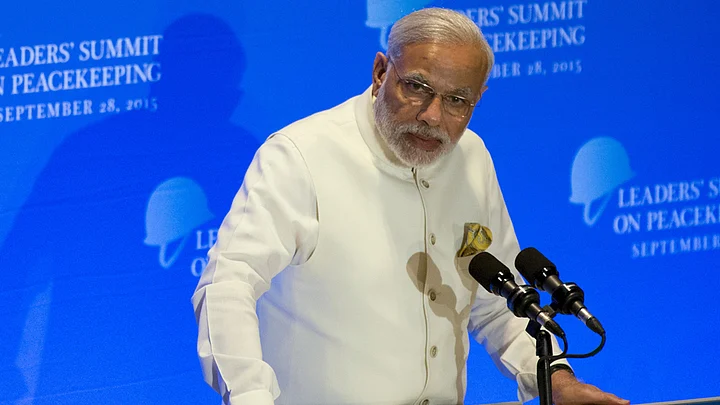Prime Minister Narendra Modi has pointed out that the UN, despite its existence for 70 years, “has not been able to arrive at a definition for terrorism”. The UN accepts this in a paper of October 7, 2005 by the Sixth Committee. This is because of the fear that it might lead to “profiling and linking problem with any religious faith”. A commonly accepted definition is a mirage. Even in India we have not been able to arrive at a consensus on what constitutes terrorism.
It is not that the UN or its earlier incarnation, the League of Nations, was not concerned about terrorism. Following the 1934 assassination of King Alexander I of Yugoslavia in Marseilles by Croatian and Macedonian separatists, France proposed that the League should adopt a comprehensive convention on terrorism. This was done on November 16, 1937.
On Defining Terrorism
- The UN believes defining terrorism might lead to “profiling and linking problem with any religious faith”.
- National laws on terrorism never came into effect owing to disputes over extradition.
- The UN drew 14 legal instruments (12 conventions and two protocols), describing what constituted individual acts of terrorism.
- Since 2000 the UN Ad Hoc Committee has been examining a draft paper on “Comprehensive Convention on International Terrorism”.
- Members of various political hues are still divided over what could be the exact definition of terrorism.
However, it restricted “terrorism” only to anti-State acts by defining it as “criminal acts directed against a State and intended or calculated to create a state of terror in the minds of particular persons or a group of persons or the general public.” The League asked member states to pass national laws. But it never came into effect owing to disputes over extradition. Also, armed freedom struggles to overthrow established regimes were on the rise, some sponsored by other powers.
The same situation exists even now. The killing of Hadeel al-Hashlamun, a 19-year-old girl at Hebron checkpost on September 22, 2015 was considered by Palestinians as Israeli State terrorism. But Israel described it as self-defence.
In the 1970s, Libyan ruler Muammar el- Qaddafi opened camps to help what he called freedom struggles by the Irish Republican Army (IRA), Basque separatists, Italian Red Brigades and Palestinian groups.
Other powers like USA called it terrorism. The US notified Libya as a sponsor of terrorism. Sanctions were imposed. However, Libya was removed from that list when Qaddafi stopped aiding these “freedom fighters”. That, however, did not prevent the US and others from organising an uprising in Libya from 2011 through non-state actors to remove Qaddafi. Paul Pillar, former CIA analyst has said that this had only “worsened chaos” in the region.
On September 28, 2015, Russian President Vladimir Putin accused the Western powers – mainly USA – of interference in the Middle East and North Africa by destroying institutions, creating no-man’s lands and allowing the dreaded Islamic State to occupy the vacant spaces.
When UN Constituted Acts of Terrorism
This is the reason why the UN has not been able to find an acceptable definition of terrorism.
However, it did the correct thing by going around this problem and drawing up 14 legal instruments (12 conventions and two protocols), describing what constituted individual acts of terrorism. The first was the 1963 Tokyo convention on “in flight safety” (“Convention on Offences and Certain other acts Committed on board aircraft”).
Next was the convention against hijacking in 1970. The first hijacking was of an EL Al plane in 1968 from Rome by PLO (PFLP of George Habbash). This is called The Hague convention. In 2010, an additional protocol (Beijing protocol) was added to this convention.
In 1971, another convention was passed to reinforce air travel security on the recommendation of the Montreal based International Civil Aviation Organization. In the same year, diplomats were protected under a special convention. This was necessitated by a spate of attacks on the diplomatic missions of USA, UK, Israel and Cuba during 1971-1972. In 1979, hostage taking was prohibited.
Current Scene
Eight more legal instruments were drawn up between 1980 and 2005 for the safety of nuclear material, prevention of airport violence, safety of maritime navigation and fixed platforms (oil drills), prevention of plastic explosives, terrorist bombings and terrorist financing.
After 9/11, the Security Council passed Resolution No: 1373 on September 28, 2001 calling upon all members to implement the above 14 legal instruments. The UN Drug Control & Crime Prevention Secretariat was given the nodal role in monitoring compliance. For members this meant not only ratifying the UN conventions but also passing domestic laws, creating national security doctrines, budgetary allocations and administrative and personnel support.
Since 2000, the UN Ad Hoc Committee has been examining a draft paper on “Comprehensive Convention on International Terrorism” – including a common definition. The latest report on the UN web is of 2011. The progress is unsatisfactory. Members of various political hues are still divided over what could be the exact definition of terrorism. In my opinion, it will be a miracle if we arrive at any acceptable global definition.
(The writer is a former Special Secretary, Cabinet Secretariat, and also member of the High Level Committee which enquired into the police performance during 26/11 Mumbai.)
(At The Quint, we question everything. Play an active role in shaping our journalism by becoming a member today.)
